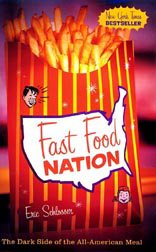
Wow, it's a modern day "The Jungle" (Upton Sinclair), except it's well-written and not heavy-handed. Despite the title, this is not a book on the same subject as Morgan Spurlock's "Supersize Me." This book is much more about how "fast food culture" has transformed America, both in our eating habits and corporate structures. As a matter of fact, a lot of time is spent on how the fast food industry has adversely affected the meatpacking industry, bringing it back to the point where it's almost as bad as it was when Upton Sinclair wrote The Jungle. Not only that, but the fast food industry has by itself depressed wages and continually lobbies against increasing the minimum wage. Despite all the recent criticisms leveled against Wal-Mart for the way they treat their workers, fast food chains long ago achieved that level of worker subordination.
The book traces the historical development of the fast-food chains from their beginnings in Anaheim to their global development (with McDonald's and others in China, Germany, Japan, Australia and a multitude of other places worldwide). It also traces the development of the fast-food process, from the original McDonald brothers' Speedee Service McDonald's through Ray Kroc's introduction of assembly-line ethics to the kitchen, to the current standards now of trying to make the machines and equipment so easy to use that even illegal immigrants who can't read can work the kitchen adequately.
On a related subject, Schlossinger goes in to detail about how the rise of the fast-food industry has affected the meatpacking industry in America (almost entirely adversely). Meat production is now concentrated in the hands of four corporations and their giant meat processing plants, fostering the spread of disease and the destruction of traditional meat producers (ranchers) and sellers (butchers).
Not coincidentally, unions have been destroyed in both industries. The author details incidents where McDonald's has literally torn down a restaurant where workers were trying to unionize and rebuilt a new one mere blocks away, re-hiring none of the workers who were fired. Meatpackers claim not to hire illegal immigrants, but they run bus lines back and forth from Mexico.
The reshaping of the meat industry has also had an adverse effect on America's ranchers, and the environment. Most cattle are now raised in gigantic feedlots, where they eat grain and get covered in manure. The feedlots are an excellent breeding ground for disease, most of which, thanks to the efforts of the meatpacking industry, goes undetected.
Anyway, that should be enough to get you wanting to read this book. Heck, even if you don't want to read this book, if there's one book you need to read this year, this is it.
4 comments:
Great book. It's like a modern-day "Jungle" but totally non-fiction.
I shouldn't say anything because I've only read the first few chapters of the book, but what surprised me the most was where he mentions the issue of the unwillingness of some fast food chains to provide adequate security to their employees. The physical danger from crime that comes as a result of working at fast food joint is not something I would consider in advance being included as a topic of the book.
Yeah, that's one example of the surprising things that this book hsa in store for you. That's another reason to read it.
It's a very good book. I still eat at fast food places, but now I am informed.
Post a Comment